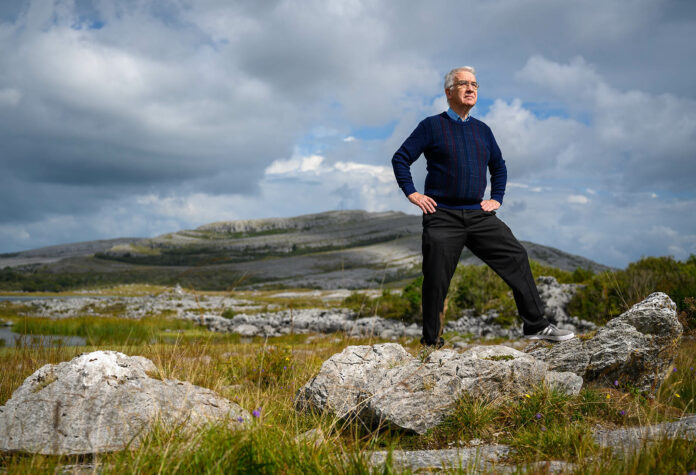A DOOLIN musician has blended music, poetry, storytelling and the breathtaking visual beauty of the Burren landscape to create what has been described as a “love letter to Clare”.
Towards the end of the new 30-minute movie “Always a Journey Never a Destination” A Clare Footprint” Oliver O’Connell delivers a key message – “In Clare, music is not what we do: music is what we are.”
Instead of opting to showcase well-known tourist areas such as Bunratty Castle, the 73-year-old father-of-three filmed lesser known but beautiful parts of the Burren, which are skilfully interwoven in his own life journey story with music, poetry and his own distinctive prose.
The North Clare accordion player is thrilled with the reaction to his “legacy to Clare”.
“I wanted to do something that wasn’t done before and I know I got in this movie from the reaction of people who matter,” he said.
Accomplished Limerick singer, fiddler and composer, Niamh Dunne, who is a member of the renowned band Beoga, described the movie as a “love letter to Clare”.
Three weeks before his untimely death, Dr Mick Moloney visited Mr O’Connell’s home in Rockforest with 40 other Americans, and had planned to promote the movie in the United States of America until his passing scuppered these plans.
In a statement released after his death last July, President Michael D Higgins described Dr Moloney as an admired Global Distinguished Professor at Glucksman Ireland House, New York University, as part of their Irish Studies Programme and Music Department.
President Higgins said his passing was a loss to the musical heritage of Ireland, to Irish America and to Irish music worldwide.
In 2013, President Higgins presented Dr Moloney with a Presidential Distinguished Service Award for his exceptional contribution as a folklorist, musician and scholar.
Mr O’Connell said Dr Moloney was crying when he first saw the movie.
In a glowing tribute that is included on the CD back cover, Dr Moloney stated, “Oliver O’Connell, the redoubtable musician and sage with the assistance of his team of expert collaborators, has created a unique work of art blending music, poetry, story telling and the breathtaking visual beauty of the Burren landscape in his beloved Clare.
“Like the Burren itself, this film is a paean to the power of the art to heal and restore the human spirit. This movie honours the past and present and looks to the future with love and optimism. It is a work for the ages.”
Mr O’Connell admitted he was very fortunate to find two German filmatographers – Sarah Thomsen, who did the production design, and Stephen Decker, who was responsible for the very time consuming drone and hand held camera work and editing.
Last September, this trio completed 16-hour days of shooting eight or nine days in a row as well as some filming in 2019.
Having watched his own movie “at least 350 times”, the Burren film-maker picked out the most minute details for the editing scrap heap.
It took about ten hours of filming to get one minute of movie footage. In fact, 174 hours of raw footage had to be distilled down to 30 minutes.
“There isn’t a weak second in it. No one can find it. I have had real film critics who failed to find anything in it. This is my legacy to Clare and there is nothing like this on the market.
“Stefan and Sarah were very meticulous. They shot in the Burren where I am standing in the water one day last September when it was pouring rain. The rain was pouring down my neck.
“I said to myself ‘what are we doing here’. But Stefan saw the greyness, that end of the world feeling, the cold water and my red jumper in the middle of it. This showed incredible vision and energy.
“Everyone who has seen the movie is blown away by the quality of the sound, mixing and the cinematography.
“There is one scene where a drop of water drops down. We got up one morning at 6am, I was frozen and wet. Sarah was down on her two knees looking at the wall, Stefan had the drone in the air and they were talking in German.
“I was standing there for an hour wondering what they were doing. Eventually he brings over the camera and places it near the wall. At the top of a Burren rock, a piece of dew had formed and they were waiting for it to drop.
“They waited for an hour and 15 fifteen minutes for the dew to get bigger and bigger. Eventually Sarah bent down near the wall and Stefan caught it as it fell down.”
He recalled at one stage Stefan spent an hour recording the eerie silence of the Burren.
Now living in Rockforest behind Mullaghmore, Mr O’Connell loves walking through the nearby Famine Road on a daily basis and Mullaghmore two or three times a week.
The movie chronicles a healing journey, music journey and a unique Clare footprint with two dancing shoes with the help of the unique Burren landscape, local characters and music.
His redemption peaks in the midst of a rousing music session in an old traditional cottage near Ballinalacken Castle, which features the old sacred heart lamp, flag floor and the photograph of Michael Collins on the wall that has remained virtually untouched since the famine.
The participants were Des Mulkere, banjo, Michael Kelleher and Joe Rynne, fiddles, Christy Barry flute, Bobby Gardiner, Oliver O’Connell and Johnny Conlon, accordions, Michael Blackie O’Connell and Mickey Dunne, uileann pipes, Joe Lee, concertina, Sarah Thomsen, concertina, Billy Archibold, bodhran and Cyril O’Donoghue on bazouki.
Three uileann pipers Finbar Furey, Michael “Blackie” O’Connell and Mickey Dunne together with musicians Mick Foster and Moyra Fraser are featured in the movie.
Musicians including Mr O’Connell, Des Mulkere, Johnny Conlon, Joe Rynne, Bobby Gardiner, Christy Barry and Michael Kelleher are the last surviving North Clare musicians of this age group.
Next month, Mr O’Connell will be joined by his son, Blackie and Mickey Dunne, who wrote the movie soundtrack, for the USA launch night at the Clare Association Dinner on Sunday, October 16 in Mineola, New York.
The Clare launch takes place on Culture night on Friday September 23 at the Teach Cheoil in Ennistymon and also at the Loft in Shannon Golf Club on Saturday, October 1.
The movie has been supported by Clare County Council and Councillor Johnny Flynn
“Everyone has been hurt by Covid-19. The landscape, people and music of County Clare has made me a different person.
“I believe this movie has a universal appeal outside Clare and has the potential to be very big. It is shot in the best resolution that could be shown in the cinema.
“There is no landscape like the Burren. You can’t get a proper sense of the place by just taking a photograph of Mullaghmore. You have got to smell it, hear it, listen to it and feel it. You have to walk down the Famine Road and be open to it.”
“For me, it is the peace and quiet. It is shape of the rock and the stones on the rugged landscape. The Famine Road was cut out of the Burren a 1,000 years ago. That was previously the main road from Kinvara to Ennis.
“How did our ancestors make a road 1,000 years ago without any JCB? I bring so many people to the Burren, I am like a walking tourism chief,” he said.
He believes Clare people are different from those in other counties as they are shaped by their unique landscape.
“Clare people play music differently, they have a different way of talking. We are a different people. That is why I showcased the authentic Clare in the movie.
“I was 45 years old before I really appreciated the true value of the Burren and what the Americans were talking about.”
Born between Lisdoonvarna and Doolin, Mr O’Connell was the youngest of eight.
Despite playing the accordion as a teenager, he took a long break from playing for about 40 years, opting to resume following the death of his wife.
A well-known accordion player and music composer, he knew all the main musicians in the Clare music scene.
During the two Fleadhanna Cheoil in Ennis he acted as master of ceremonies in the gig rigs for the two weeks.
Finbarr Furey regularly stays in his new home, while his son, Michael “Blackie” is a household name thanks to his prowess on the uileann pipes.
Shortly after the death of his wife, Maureen from ovarian cancer 23 years ago, an artistic gem opened in his brain allowing him to write poetry, his life story on an audio book as well as a new book on poetry and prose for Christmas.
The cancer was so aggressive Maureen (48) only lasted six weeks from the diagnosis.
“I had a tough life. I had two bouts of cancer, lost my business, lost my wife and home. I lost a million Euro when my business went. I had stomach and kidney cancer at the same time.
I had two operations within three months in late 2011 and 2012. Both of them were life-threatening. I had two thirds of my stomach taken out, one of my kidneys was taken away and I was in eight car crashes.”
Before the economic crash in 2008, the accordion player ran a successful plant hire company employing 35 people near Clare Marts at Quin Road, Ennis.
However, he was financially hammered when no-one would pay him forcing the firm to go under and forcing his early retirement.
Describing himself as a very good businessman, Mr O’Connell recalled he was involved in the freight industry in Shannon for years, bringing a lot of new companies into Ireland’s newest town.
Looking back at the global economic meltdown, he believes the business world became more technologically driven.
“Before 2007/2008, I was well known and respected and could have got anything I wanted from a bank in terms of a loan.
“After the crash, I wouldn’t have got €100 because everything changed in business, it was all over. My world collapsed.
“Previously, I could have drawn up a business for a new €12 million company – the costings, the labour the whole lot. Now I wouldn’t go into a new business if I won the Lotto.
“I live in the heart of the Burren and I have a different aspect on life. I have gone the artistic route. I get a lot of healing from the Burren and I don’t take any medication now, I am completely cured.
“I see greater benefits in things I didn’t take notice of before when I was making millions of Euro,” he concluded.
East Clare correspondent, Dan Danaher is a journalism graduate of Rathmines and UL. He has won numerous awards for special investigations on health, justice, environment, and reports on news, agriculture, disability, mental health and community.




